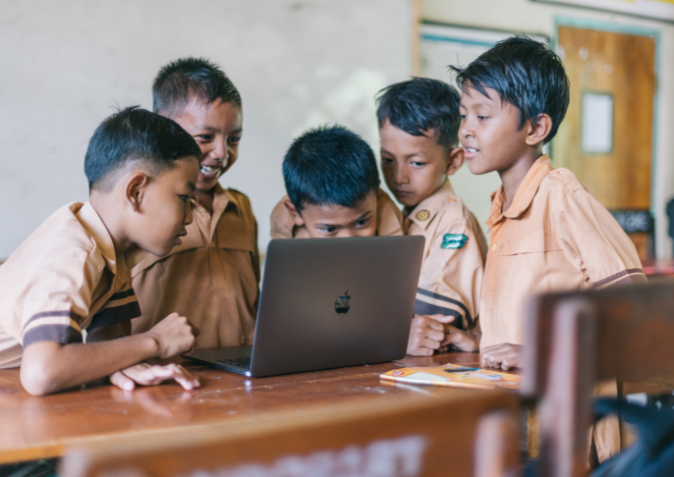Inclusive, quality education and lifelong learning opportunities.
Our aim is to provide the world with access to quality education and facilitating healthier lifestyles. Through a network of skilled volunteers, we deliver a range of health and education initiatives at the individual, community, and global level. For more than a decade PTW has utilised emerging technologies to deliver our health and education initiatives, meeting the needs of an increasingly connected world.

The Social Value Of Education
Increased and improved quality of education is a cornerstone of social progress. The benefits of education can be looked at from an individual or collective perspective. For example:
- Education develops productive skills valuable to an individual, these skills lead to increased opportunities within the workforce and society. This helps maintain the individual’s prospects and competency in a global economy
- Education develops civic skills that allow for meaningful participation in civil society and political life, where the society benefits from more informed and engaged citizens
- Education develops talent and interests for individuals, leading to the progression and growth of knowledge and ideas within society
- Education develops our understanding of equality, producing communities that are more aware and conscious of social inclusion and the ability to identify the occurrences of injustice and social exclusion
Where are we trying to help:
One of the main focuses of PTW is to improve education inequalities and reduce gaps by providing free education opportunities to vulnerable and disadvantaged children in low-income countries. Whilst many high-income countries may provide access to free high-quality education, not all children receive these opportunities. Inability to access education has led to statistics including:
- 1 in 4 girls in developing countries are not in school
- 57 million primary-aged children remain out of school
- 6 out of 10 children and adolescents are not achieving a minimum level of proficiency in reading and math
- The cost of illiteracy to the global economy is estimated at USD $1.19 trillion
- 420 million people would be lifted out of poverty with a secondary education, thus reducing the number of poor worldwide by more than half
- Mortality decreases for every additional year in schooling by 7.2% for men and 6% for women
- The chances of optimum health is up to 8 times higher for citizens with eighteen years of education versus only seven
We have been positively transforming the world by:
PTW targets education needs through our grassroots development, community engagement and global enlightenment projects. This has included providing education and support that includes:
- Closing the education gap by providing academic support in subjects such as Maths, English and Science to children in our projects in remote Nepal where these skills and knowledge are limited
- Empower children in Uganda with skills on how to learn effectively, whilst also upskilling their classroom teachers with additional teaching and education resources
- Addressing education inequalities and providing mentoring to vulnerable and disadvantaged girls in India who are not provided with these opportunities in school, helping them with career preparation and professional development
- Helping communities realise the long-term importance of education through mentoring and leadership in Brazil to reduce the number of children dropping out of or missing school
- Create socially responsible communities by providing practical education on social impact areas including climate change, wildlife conservation, responsible consumption, renewable energies and economic growth through interactive workshops in Australia and the UK
- Developed and created positive educational resources and support materials that individuals globally have used to make positive changes to their ability to learn, teach and be more conscious global citizens
We have been positively transforming the world by:
The educational resources and publications we provide go through a strict process of review and evaluation to ensure the quality of information is accurate, precise, unbiased and follows evidence-based practises. Across all our grassroots development, community engagement and global enlightenment projects, we utilise experts including teachers, university professors, subject matter experts and education professionals to develop, review and critically evaluate the information and health education we provide.
In global development, education plays a fundamental part in having the world achieve the sustainable development goals outlined by the United Nations.
- Education is critical in helping populations understand and address the impacts of climate change, and in encouraging a change in attitudes to adopt more sustainable lifestyles and develop skills that support different modules of economies – helping people adapt to the effects of climate change
- Education is critical in helping populations understand and reduce inequalities. These include social, economic and political inequalities due to age, sex, disability, race ethnicity, origin, culture or economic status. Education attenuates prejudice and provides individuals with the knowledge of historical, social and economic factors responsible for inequality.
- Education is critical in addressing wildlife conservation and a necessary tool in the management of wildlife protection. By imparting knowledge to communities and enhancing indigenous and traditional conservation knowledge, we can reduce the risks of extinction and endangerment of all species on earth.
- Education facilitates social interactions with diverse groups that allow for discussion across different viewpoints, promoting the peer-to-peer diffusion of knowledge about the structural sources of inequality. From promoting awareness of inequalities, education is also the crux of developing solutions and structural mechanisms for improving inequalities – leading to social and global unity
Not only does PTW provide education to the vulnerable and disadvantaged, but also to our global collective.
Regardless of income and socioeconomics, education provided to all global citizens plays a central role in improving social unity, global development, and a sustainable future. For these reasons, PTW holds education as a fundamental pillar of creating a positively transforming world. PTW ensure that our education classes and activities are run at low-to-no cost to demonstrate our belief that quality education should be accessible and possible for all.